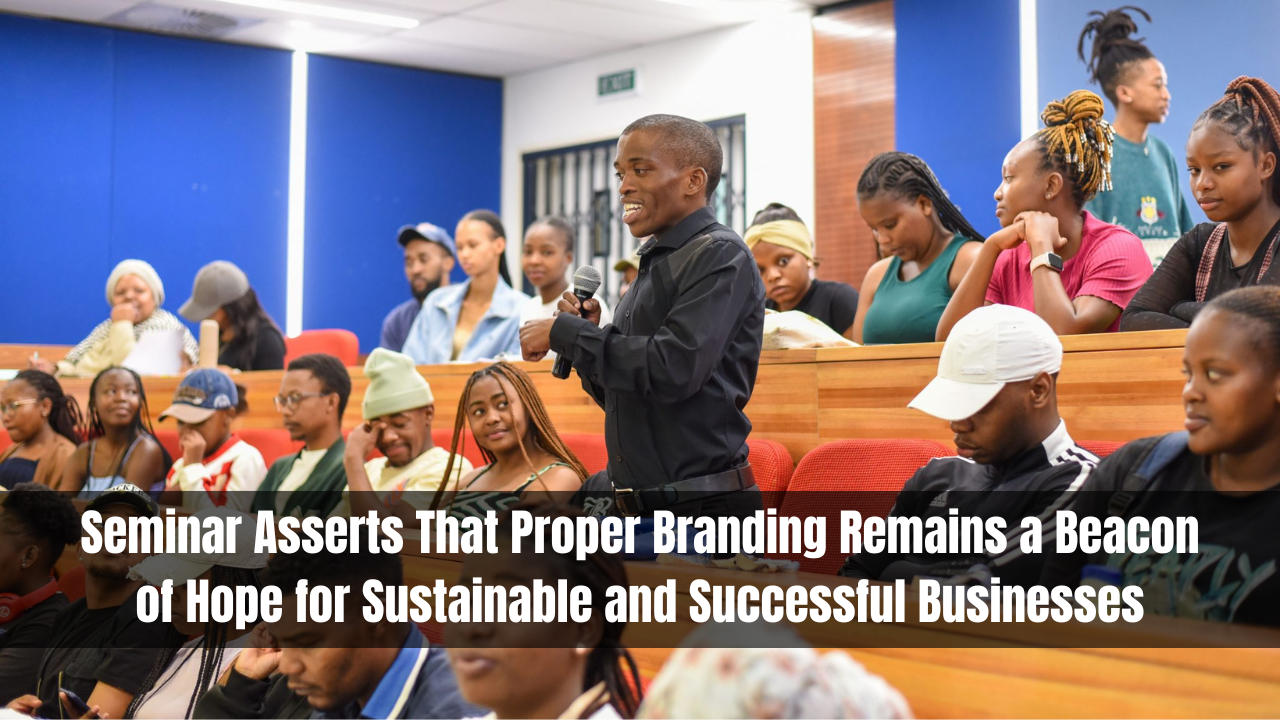VUT Department of Marketing Held a Seminar to Discuss the Importance of Branding in Business

VUT Department of Marketing Held a Seminar to Discuss the Importance of Branding in Business. It was held in the auditorium of the Centre for Academic Development (CAD) of VUT. The seminar’s theme was ‘Branding for Sustainable Business’.
Mr Thebe Magapa, a marketing lecturer, gave the event its purpose and set the tone by stating that universities play an important role within communities. Additionally, he mentioned that a strong university brand can entice prospective students as well as funding, thus benefiting both the university and the community.
VUT Department of Marketing Held a Seminar to Discuss the Importance of Branding in Business
The purpose of today’s meeting is to explore the evolution in the history of branding and its significance. There will be a variety of topics discussed by experts from higher education institutions, companies, and trends from a variety of companies. The question is, does branding matter? Is it perception or reality? ” said Mr Magapa.
From their industry experiences, speakers provided valuable insights and perspectives on branding during the seminar. During the gathering, attendees also discussed the role of rebranding in higher education institutions and the impact it has on universities and communities.
A particular focus was given to the relevant role branding plays within higher education institutions and its relevance to sustainable business practices for students within the Marketing discipline. It was also useful to understand the challenges and opportunities associated with rebranding efforts at universities, as well as the significant impact on the reputation and image of South African educational institutions.
The Brand and Marketing Manager at VUT, Mrs Tisch Farrel, was one of the key speakers. In order to enhance the image, reputation, and appeal of higher education institutions (HEIs), such as universities and colleges, rebranding is a strategic process.
She also emphasizes that branding is much more than a logo and slogan, as she is the custodian of the VUT Brand and Corporate Identity (CI) Manual. As she explained, it can be influenced by a variety of factors, including leadership changes, changes in educational offerings, mergers and affiliations, as well as the need to adapt to changing market demands.
There is more to branding than just logos, websites, and business cards. It is an experience, a promise, and a voice. Your brand is the heart and soul of your business, Tisch said. It is how you make people feel, what you tell them, and how they trust you. In addition, she noted that meaningful brands often exhibit a strong sense of social responsibility
They can contribute to the community by providing resources, supporting, or even changing their operations to help solve social problems. Contributions can be made in the form of charitable donations, volunteer work, or the repurposing of manufacturing facilities to make essential products.
Havas Media South Africa’s Head of Strategy-Africa, Carel Scheepers, also spoke about the importance of meaningful brands during difficult times. Carel believes meaningful brands contribute to stability, trust, and support, both within and outside of society, in difficult times.
He noted that these brands have a deeper purpose and a set of values that resonate with their audiences beyond just selling products.
A hope for the continent of Africa, the agony of Africa. A founding member of Brand Leadership, Mr Thebe Ikalafeng, advocates reclaiming African identity through branding, cultural reclaiming, and ideas reclaiming through storytelling. In addition, he said, we need to shift away from Western-centric branding strategies on the African continent towards more culturally sensitive and regionally relevant approaches.
The African continent and its people are also unique and diverse, according to Ikalafeng. The benefit to both brands and local communities can be realized when brands invest in understanding and connecting with African consumers.
As Africans speak thousands of languages and dialects, Thebe strongly believes brands should aim to resonate with the values and identities of African consumers when it comes to sustainable development goals (SDGs). In order to gain a thorough understanding of the target audience
He suggests conducting market research, analyzing consumer behavior, and collaborating with local experts. It is important to understand the local culture and customs in order to build an effective brand in Africa.
As a Life Coach and a VUT alumnus, Mr Selepe Madisha addressed the audience from his personal perspective to highlight the importance of identity in branding. “Personal branding encompasses both self-awareness and self-improvement as well as how others perceive you.
You must reflect on your values, strengths, weaknesses, and goals in order to build and maintain your personal brand. Moreover, he encouraged participants to use their brand in all aspects of their operations or assignments.
Tshepiso Dumasi of Bidvest Automotive and Mosele Maloka from PEPSICO also spoke during the day.
See Official Site For More Detail






